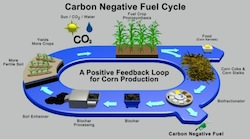Cool Planet Energy Systems, a developer of small scale biorefineries which convert non-food biomass into gasoline, jet fuel, and soil biochar, has announced the selection of Alexandria, Louisiana as the location for their first commercial biorefinery. The facility will be located on the Port of Alexandria in Rapides Parish and will serve as a showcase facility. The goal of Cool Planet is to build hundreds of additional small scale biorefineries across the U.S. Construction is expected to be complete by the end of 2014.
The site was chosen due to tremendous support from the city of Alexandria, and the economic development team from the state of Louisiana. The location provides access to an abundance of renewable biomass feedstock, the ability to load fuel onto barges, rail lines and trucks, and local talent to operate the facility.
“Louisiana is known for its substantial oil interests, but now will also have the distinction of being home to the first, of what is planned to become many, production facilities for Cool  Planet’s renewable, high-performance gasoline and soil enhancing biochar,” said CEO Howard Janzen. “Our goal for the Alexandria facility is to be economically competitive with conventional fuels made from non-renewable crude oil.”
Planet’s renewable, high-performance gasoline and soil enhancing biochar,” said CEO Howard Janzen. “Our goal for the Alexandria facility is to be economically competitive with conventional fuels made from non-renewable crude oil.”
The company believes it will have one of the lowest capital costs per plant in the refining industry, with project economics that work at facilities 100 times smaller than conventional refineries, while being able to use a wide variety of renewable biomass materials as inputs. construction is expected to be complete before the end of 2014.
In other news, Cool Planet has completed a joint vehicle road test with Ventura County, California. Officials ran a 5 percent blend of the company’s renewable, low-carbon gasoline for six weeks during their normal operations. The demonstration received special approval from the California Air Resources Board (CARB).
External testing of the fuel was conducted at various points during the fleet demonstration. Carbon-14 dating proved that Cool Planet was successfully turning renewable plant material into drop-in fuel.

